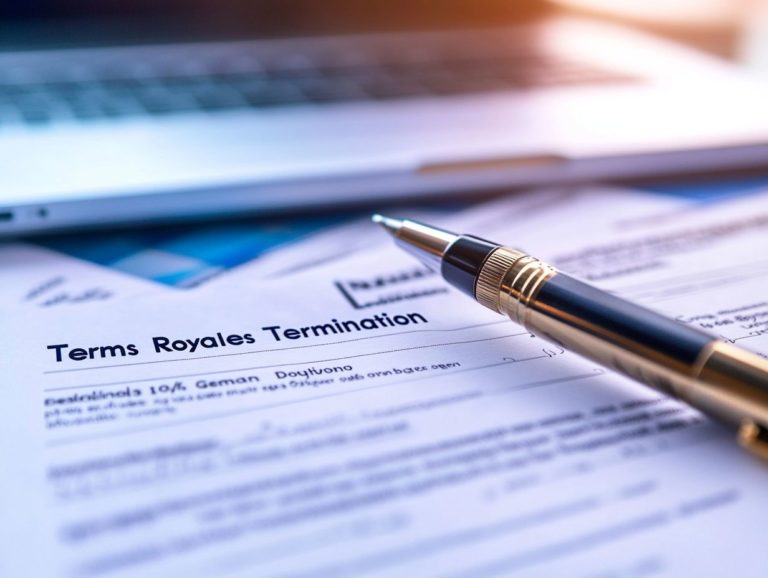How to Terminate a Licensing Agreement Properly
Navigating licensing agreements can be quite intricate, especially when it comes to termination. Understanding the definition and purpose of these agreements lays the groundwork, but knowing when and how to terminate them is vital.
In this article, you’ll discover common triggers for termination, outline the essential steps to execute it correctly, and highlight the potential legal and financial consequences of improper termination. You will also examine alternatives to termination, such as renegotiation, providing you with a broader perspective.
Equip yourself with insights that will empower you throughout your licensing journey!
Contents
- Key Takeaways:
- Understanding Licensing Agreements
- Reasons for Terminating a Licensing Agreement
- Steps to Properly Terminate a Licensing Agreement
- Potential Consequences of Improper Termination
- Alternatives to Termination
- Frequently Asked Questions
- 1) What is a licensing agreement and why would I need to terminate it?
- 2) Are there any specific steps I should follow when terminating a licensing agreement?
- 3) Can a licensing agreement be terminated at any time?
- 4) What are the potential consequences of terminating a licensing agreement prematurely?
- 5) Do I need to provide a reason for terminating a licensing agreement?
- 6) What should I do if the other party does not agree to the termination of the licensing agreement?
Key Takeaways:

- Review the licensing agreement and contractual obligations carefully before proceeding with termination to avoid potential legal and financial consequences.
- Notify the other party of the termination in writing and negotiate termination terms to ensure a smooth and mutually beneficial end to the agreement.
- Consider alternatives to termination, such as renegotiation and modification of the agreement, to maintain a positive relationship with the other party.
Understanding Licensing Agreements
Licensing agreements are essential in the world of intellectual property, establishing a clear framework that governs the relationship between licensors and licensees.
These legally binding contracts outline the terms under which one party can use another’s ideas or creations. They cover key elements like licensing fees, performance obligations, and the renewal process.
By fully grasping these agreements, you can better manage risks and protect your financial interests, which is vital for maintaining the integrity of your business operations.
Definition and Purpose
Licensing agreements are contracts that outline how you, the licensee, can use the intellectual property rights owned by the licensor. This creates a solid legal foundation for your commercial endeavors.
These agreements protect the licensors’ interests while granting you the necessary permissions to utilize valuable intellectual property, such as trademarks, patents, and copyrights.
By specifying guidelines and obligations, they create a framework for both you and the licensor to follow, ensuring compliance with all relevant laws. This helps prevent unauthorized use or infringement and mitigates potential disputes, keeping both parties informed of their rights and responsibilities.
Ultimately, licensing agreements are crucial for fostering innovation and collaboration while safeguarding the core interests of everyone involved.
Reasons for Terminating a Licensing Agreement
Terminating a licensing agreement can arise from various circumstances, including breaches of contract or failure to adhere to established terms.
This can lead to significant legal consequences for both licensors and licensees involved in the agreement.
Common Triggers for Termination
Be aware of the common triggers that can lead to the termination of a licensing agreement, such as failing to meet performance obligations, not paying licensing fees, and violating agreed-upon terms.
These issues can have serious financial repercussions. Understanding these factors is essential, as they can significantly disrupt your ability to operate under the intended agreement.
For example, consistently underperforming by missing sales targets or failing to meet market commitments in the contract creates grounds for termination. Similarly, not paying licensing fees not only puts immediate financial pressure on you but also erodes trust between the parties involved.
Real-world scenarios, like the dispute between a well-known software company and its partner that escalated into litigation over missed royalty payments, underscore the importance of adhering to contractual obligations.
Breaches and non-compliance can tarnish your company s reputation and lead to substantial penalties, complicating the financial dynamics of the partnership even further.
Steps to Properly Terminate a Licensing Agreement

To terminate a licensing agreement correctly, follow these clear steps.
Start with a thorough review of the contract to meet all legal requirements.
Next, prepare your documents and negotiate the terms with the other party.
Every step is crucial for a smooth termination process.
Reviewing the Agreement
Before you begin, carefully look over the licensing agreement and its rules.
Pay close attention to the rules about ending the agreement and any legal issues that may come up.
Understanding these aspects is essential, as they impact both parties.
The rules about ending the agreement specify the conditions for dissolving the contract, ensuring that neither side is caught off guard.
The rules you must follow outline responsibilities before, during, and after termination, protecting you from legal issues.
By reviewing the agreement thoroughly, you clarify your rights and strengthen future business relationships.
Notifying the Other Party
When notifying the other party about your intent to terminate, you must communicate carefully.
It s best to put this in writing to ensure clarity about the termination terms.
This process provides a formal record, helping to avoid potential disputes later on.
Consider using email, certified mail, or a follow-up phone call for effective communication.
Consult legal guidance to ensure compliance with applicable laws, as neglecting proper protocols could lead to costly issues.
Including specific language from the original contract can strengthen the termination s validity and protect both parties’ interests.
Negotiating Termination Terms
Negotiating termination terms is a key step that can lead to a mutually beneficial agreement.
These discussions often revolve around payments, intellectual property rights, and potential alternatives to avoid disputes.
Keep communication open and practice active listening to understand each party’s concerns and priorities.
For example, proposing a phased exit strategy can minimize disruption and ease the transition.
Highlighting the mutual benefits of resolving matters amicably encourages cooperation.
Consider mediation as a neutral ground for negotiations, allowing both parties to explore alternative solutions.
By prioritizing collaboration, you can reach agreements that satisfy everyone involved.
Potential Consequences of Improper Termination
Improperly terminating a licensing agreement can lead to significant legal and financial consequences for both parties.
This includes the risk of disputes and possible liability for damages from breaching contractual obligations.
It s crucial to navigate this process carefully to avoid costly complications.
Legal and Financial Ramifications

The legal and financial consequences of improper termination can be severe. This can lead to lawsuits, penalties, and payment obligations in the licensing agreement.
Navigating these complexities can be tricky. Each party may interpret the terms of their agreements differently. Ignoring these stipulations invites litigation and jeopardizes your company’s reputation and future business prospects.
Misunderstandings surrounding licensing disputes can amplify financial liabilities. This can lead to significant fines or compensatory damages. Thus, understanding your contractual obligations and the potential repercussions of non-compliance is essential.
Doing so will help protect your interests and mitigate risks effectively.
Alternatives to Termination
Instead of choosing termination, consider exploring alternatives like renegotiating or modifying the licensing agreement.
These options can effectively address compliance issues and operational inefficiencies while maintaining the integrity of your existing relationships.
Renegotiation and Modification of Agreement
Renegociar y modificar acuerdos de licencia puede ser tu oportunidad dorada para abordar preocupaciones sobre cumplimiento, obligaciones de desempe o y el panorama del mercado en constante cambio de manera efectiva.
Este proceso es clave para adaptarse a cambios en la demanda del consumidor y avances tecnol gicos. Si te encuentras luchando por alcanzar los objetivos de ventas, considerar ajustes en las tasas de regal as o extender los plazos de rendimiento podr a crear una situaci n beneficiosa para todos los involucrados.
Establece canales de comunicaci n claros, revisa regularmente las tendencias del mercado y mantente abierto a t rminos flexibles que reflejen el panorama actual. Cada ajuste no solo te ayuda a mantener el cumplimiento con los est ndares de la industria, sino que tambi n fortalece la longevidad y el xito de tu asociaci n en un mercado competitivo.
Frequently Asked Questions
1) What is a licensing agreement and why would I need to terminate it?
A licensing agreement is a legally binding contract between two parties that allows one party (the licensee) to use the intellectual property of the other party (the licensor) in exchange for a fee. Termination may be necessary if the terms of the agreement are no longer beneficial or if there is a breach of contract by either party.
2) Are there any specific steps I should follow when terminating a licensing agreement?

Yes, it is important to follow proper procedures when terminating a licensing agreement to avoid any potential legal issues. This typically involves reviewing the terms of the agreement, providing written notice to the other party, and following any agreed-upon termination procedures outlined in the contract.
3) Can a licensing agreement be terminated at any time?
It depends on the terms outlined in the agreement. Some agreements may have a specific termination date, while others may allow for termination at any time with proper notice. Review the contract carefully to understand the terms and conditions for termination.
4) What are the potential consequences of terminating a licensing agreement prematurely?
If a licensing agreement is terminated prematurely without proper justification, it may result in a breach of contract and potential legal action. The licensee may also be held responsible for any financial losses incurred by the licensor due to the termination.
5) Do I need to provide a reason for terminating a licensing agreement?
In most cases, it is not necessary to provide a reason for terminating a licensing agreement. However, some agreements may have specific requirements for termination, such as a notice period or valid reason for termination. It is important to review the contract and follow any necessary procedures.
For more specific guidance, consult a legal expert today!
6) What should I do if the other party does not agree to the termination of the licensing agreement?
If the other party disagrees with the termination, talking to a lawyer is a wise first step.
Review the agreement carefully for any valid reasons to terminate.
You can negotiate a mutual agreement or consider legal action if necessary.
Following proper procedures is crucial to avoid potential legal issues.






